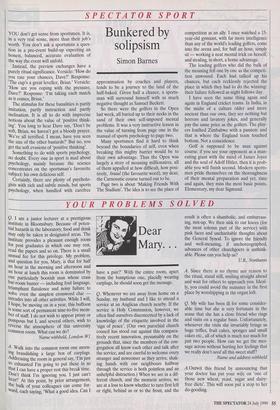SPECTATOR SPORT
Bunkered by solipsism
Simon Barnes
YOU don't get sense from sportsmen. It is, in a very real sense, more than their job's worth. You don't ask a sportsman a ques- tion in a pre-event build-up expecting an honest, balanced, accurate evaluation of the way the event will unfold.
Instead, the preview exchanges have a purely ritual significance. Versicle: 'How do you rate your chances, Dave?' Response: `The cup's a great leveller, Brian.' Versicle: `How are you coping with the pressure, Dave?' Response: 'I'm taking each match as it comes, Brian.'
The stimulus for these banalities is partly imitation, partly instruction and partly inclination. It is all to do with imprecise notions about the value of 'positive think- ing'. You long to hear Dave say, 'Don't be soft, Brian, we haven't got a bloody prayer. We're all terrified. I mean, have you seen the size of the other bastards?' But no, you get the soft evasions of 'positive thinking'.
Something to do with sports psychology, no doubt. Every one in sport is mad about psychology, mainly because the science concentrates on the sportsman's favourite subject: his own delicious self.
Certainly, there are plenty of psycholo- gists with rich and subtle minds, but sports psychology, when handled with carefree approximation by coaches and players, tends to be a journey to the land of the half-baked. Given half a chance, a sports- man will surround himself with as much negative thought as Samuel Beckett.
So there were the golfers in the Open last week, all buried up to their necks in the sand of their own self-imposed mental problems. It was a very instructive lesson in the value of turning from page one in the manual of sports psychology to page two.
Many sportsmen find it hard to think beyond the boundaries of self, even when breaking this mighty barrier would be to their own advantage. Thus the Open was largely a story of moaning millionaires, all of them appalled at how difficult, how posi- tively, brutal (the favourite word), my dear, the Camoustie course turned out to be.
Page two is about 'Making Friends With The Stadium'. The idea is to see the place of competition as an ally. I once watched a 15- year-old gymnast, with far more intelligence than any of the world's leading golfers, come into the arena and, for half an hour, simply sit — working a neat mental trick on herself, and stealing, in short, a home advantage.
The leading golfers who did the bulk of the moaning fell one by one as the competi- tion unwound. Each had talked up his chances, but each recklessly rejected the place in which they had to do the winning: their failure followed as night follows day.
I have seen the same thing again and again in England cricket teams. In India, in the midst of a culture older and more ancient than our own, they see nothing but horrors and lavatory jokes, and generally pay the same price as the golfers. The play- ers loathed Zimbabwe with a passion: and that is where the England team touched bottom. Not a coincidence.
Golf is supposed to be man against course: if you see your opponent as a man- eating giant with the mind of James Joyce and the soul of Adolf Hitler, then it is prob- able you will finish second. Modern sports- men pride themselves on the thoroughness of their mental preparation and yet, time and again, they miss the most basic points. Elementary, my dear Sigmund.


























































 Previous page
Previous page